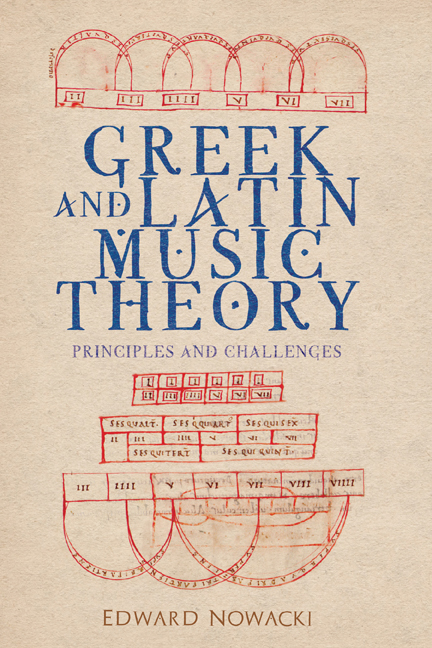7 - Aristoxenus's Anticipation of the Logarithmic Logic of Musical Cognition
Published online by Cambridge University Press: 14 August 2020
Summary
It is a commonplace of harmonic theory that each interval in a conjunct series of equal intervals (e.g., the chromatic scale) differs from its immediate neighbors by the same ratio. Though the intervals seem to the human ear to be equal, their physical magnitudes vary in geometric progression. This has been demonstrated since ancient times on the monochord and can still be seen on the fingerboard of modern stringed instruments. Geometric progression is also evident in the intervals’ frequencies, but frequency, the inverse of magnitude, could not be measured until the seventeenth century, whereas magnitude could be measured directly on the ancient monochord. Be that as it may, the subjective response of the human listener is that equal intervals arranged in a conjunct series appear to be of equal size and to form an arithmetical, not geometric, series. This discrepancy between physical acoustics and human perception was one of the motivations for a thought-provoking reexamination of the harmonic theories of Aristoxenus by Malcolm Litchfield in the Journal of Music Theory in 1988.
Litchfield argues that Aristoxenus does not deserve his reputation as an empiricist, that he lacked the means to derive his data empirically, and that they are the products of speculation. He belongs, accordingly, to the class of speculative thinkers and ought not to be opposed to Pythagoras as his epistemological opposite. To appreciate Litchfield's argument, one must grasp that his view of empiricism is operational. And indeed, if empiricism is limited to operational criteria, Aristoxenus fails the test. He could not derive his data experimentally. In order to pass the test, he would have had to possess the mathematical means to convert monochord measurements showing geometric progression into the equidistant arithmetical intervals that corresponded to his perceptions. Lacking those mathematical means, he had to rely on intuition. Nothing could be further from Litchfield's definition of operational empiricism.
But let us try to see things from Aristoxenus's point of view. His concern was musical perception, not physical measurement. He considered the scale to consist of equal whole steps and equal half steps. Limiting his scale to the interval of the fourth, he observed that it comprises five half steps of equal size and imagined them as equidistant points on a continuum.
- Type
- Chapter
- Information
- Greek and Latin Music TheoryPrinciples and Challenges, pp. 63 - 67Publisher: Boydell & BrewerPrint publication year: 2020

